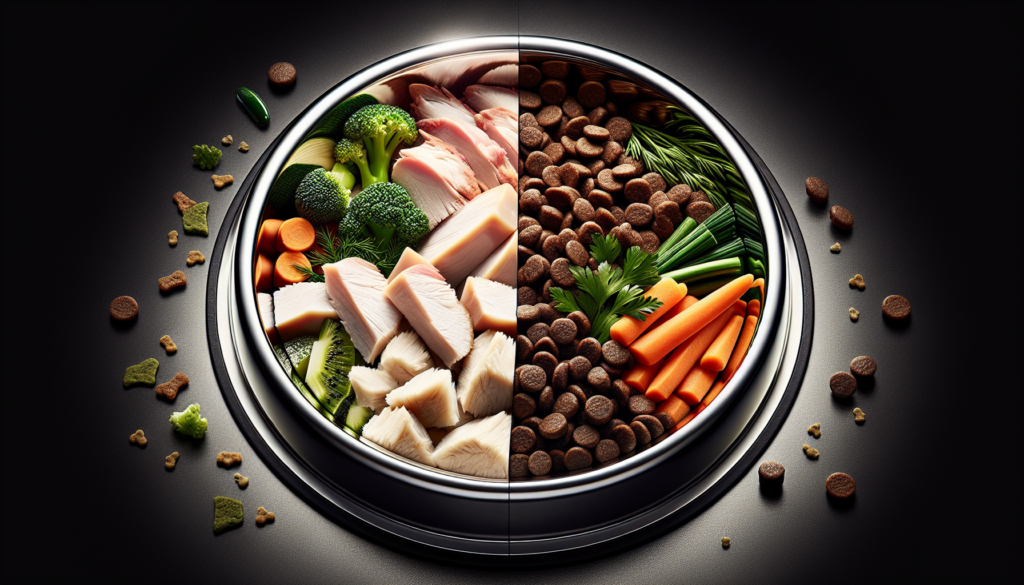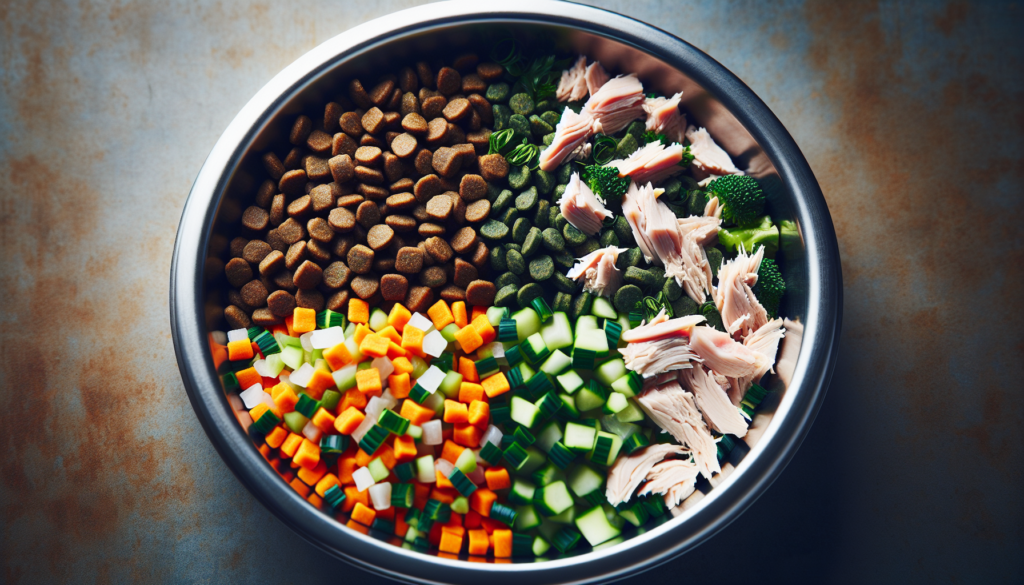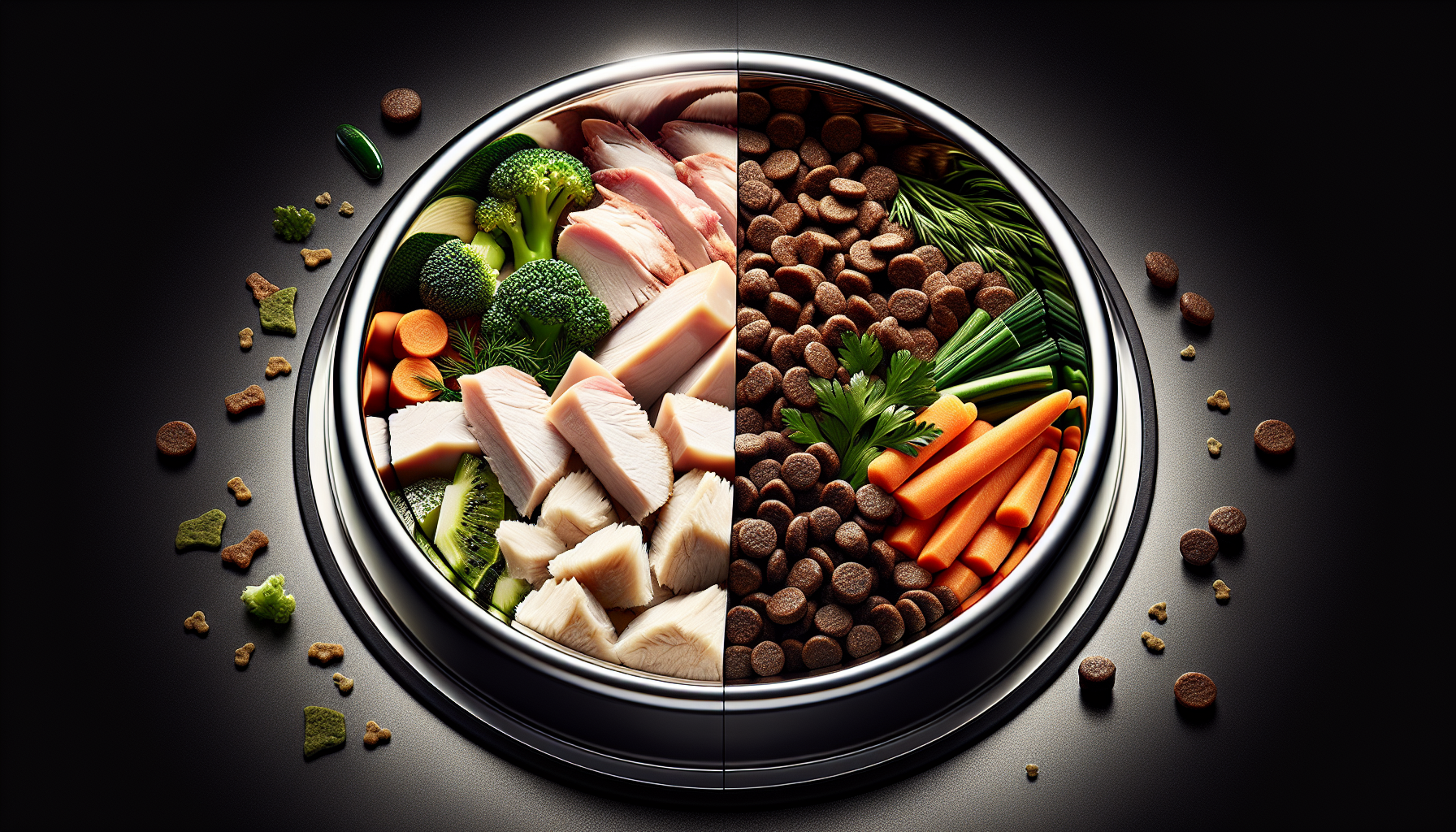In the world of dog nutrition, there is a never-ending debate between homemade meals and commercial foods. Whether you’re a seasoned dog owner or a first-time pet parent, it’s essential to understand the pros and cons of these two options to ensure the best possible diet for your furry friend. Homemade meals provide a personalized touch, allowing you to control the ingredients and tailor them to your dog’s specific needs. On the other hand, commercial foods are convenient and often formulated by experts to meet all of your pup’s nutritional requirements. So, which option will reign supreme? Let’s explore the benefits and drawbacks of homemade and commercial dog foods to help you make an informed decision for your beloved canine companion.
Nutritional Needs of Dogs
Understanding the Basics
When it comes to your furry friend’s health and well-being, nutrition plays a vital role. Just like humans, dogs require a balanced diet to stay healthy, vibrant, and full of energy. The nutritional needs of dogs vary depending on their age, breed, size, and activity level. Understanding the basics of a dog’s nutritional needs will help you make informed decisions about their diet.
Importance of a Balanced Diet
A balanced diet is crucial for dogs as it provides them with the necessary nutrients to support their growth, maintain their overall health, and prevent the onset of certain health conditions. Dogs require a combination of proteins, carbohydrates, fats, vitamins, and minerals to meet their nutritional needs. A lack of any of these essential nutrients can lead to deficiencies and health problems in your furry companion.
Homemade Dog Food
Advantages of Homemade Dog Food
Many pet owners opt for homemade dog food as it allows them to have more control over what ingredients go into their furry friend’s meals. By preparing meals at home, you know exactly what your dog is eating, and you can ensure the use of wholesome, high-quality ingredients. Homemade dog food can be tailored to your dog’s specific dietary needs, making it an excellent option for canines with allergies or sensitivities.
In addition, homemade dog food gives you the opportunity to customize your dog’s meals according to their taste preferences. This can be especially useful for picky eaters who may refuse commercial dog food. By making the food yourself, you can experiment with different flavors and ingredients to entice your furry friend.
Disadvantages of Homemade Dog Food
While homemade dog food can have its advantages, it also comes with some potential drawbacks. One of the main challenges of preparing homemade dog food is ensuring it provides all the necessary nutrients in the right proportions. Dogs have specific dietary requirements, and it can be challenging to meet these requirements consistently when preparing meals at home.
Additionally, preparing homemade dog food can be time-consuming. It requires planning, shopping for ingredients, and dedicating time to cook and prepare the meals. This can be a significant commitment for pet owners with busy schedules.
Key Nutrients for Homemade Diets
When preparing homemade dog food, it’s crucial to ensure that your dog receives all the essential nutrients they need to thrive. Some key nutrients to consider including in your dog’s homemade diet are:
-
Proteins: Dogs require high-quality sources of protein, such as lean meats (chicken, turkey, beef), fish, and legumes. Proteins support muscle development and repair.
-
Carbohydrates: Good sources of carbohydrates for dogs include whole grains, like brown rice and quinoa, as well as fruits and vegetables. Carbohydrates provide energy for daily activities.
-
Fats: Healthy fats, such as fish oil and coconut oil, are essential for promoting a shiny coat, brain function, and hormone production in dogs.
-
Vitamins and minerals: Including a variety of fruits and vegetables in your dog’s homemade diet will provide them with essential vitamins and minerals. Calcium, phosphorus, and Vitamin D are particularly important for bone health.

Commercial Dog Food
Advantages of Commercial Dog Food
Commercial dog food offers convenience and ease of use for pet owners. It is readily available in pet stores, supermarkets, and online retailers, making it a convenient option for busy individuals. Commercial dog food is formulated to meet specific nutritional standards, ensuring that your furry friend receives a balanced diet with all the necessary nutrients.
Another advantage of commercial dog food is its consistency. Manufacturers conduct extensive research and testing to ensure that their formulas provide the right balance of nutrients for different life stages and breeds. This can give pet owners peace of mind, knowing that their dog’s nutritional needs are being met.
Disadvantages of Commercial Dog Food
A significant disadvantage of commercial dog food is the lack of control over ingredients. Some commercial dog food brands may contain low-quality ingredients, fillers, or artificial additives that offer little nutritional value. It’s important to read the ingredient list carefully and choose reputable brands that prioritize the use of high-quality ingredients.
Commercial dog food may also lack the variety and customization options available with homemade dog food. While many commercial brands offer different flavors and formulas, it may not be as tailored to your dog’s unique preferences and dietary needs as homemade meals.
Different Types of Commercial Dog Food
Commercial dog food comes in various forms, each offering specific advantages and considerations:
-
Dry Dog Food: Also known as kibble, dry dog food is the most commonly available type of commercial dog food. It offers convenience, a longer shelf life, and can aid in dental health by helping to remove plaque and tartar.
-
Wet Dog Food: Wet dog food, also called canned food, contains higher moisture content and can be a good option for dogs with dental issues or those who need extra hydration. It often offers richer flavors and textures that can be appealing to picky eaters.
-
Raw Dog Food: Raw dog food, including raw meat, bones, and organs, aims to mimic a dog’s natural diet in the wild. This type of commercial dog food has gained popularity among pet owners looking for a more natural and ancestral approach to feeding their dogs.
Quality Control
Homemade Food: Ensuring Proper Nutrition
When preparing homemade dog food, it’s crucial to maintain proper quality control to ensure your furry friend receives balanced nutrition. This includes sourcing high-quality ingredients, properly storing food, and following recipes or guidelines from reputable sources.
Choosing ingredients from reliable sources, such as local farmers or trusted suppliers, helps ensure that the ingredients used in homemade dog food are fresh, safe, and free from contaminants. Proper storage of the food, including refrigeration or freezing if required, helps maintain its freshness and nutritional value.
Following trusted recipes or consulting with a veterinary nutritionist can help ensure that your dog’s homemade meals provide the necessary nutrients in the right proportions. Veterinary nutritionists can create customized meal plans tailored to your dog’s specific needs, taking into account their age, breed, weight, and any existing health conditions.
Commercial Food: Trusting the Brand
When it comes to commercial dog food, proper quality control lies in choosing reputable brands that prioritize the quality and safety of their products. Look for brands that conduct rigorous testing, have a history of safety, and follow recognized standards and regulations for pet food production.
Reading the ingredient list and nutritional information on the packaging can help you understand what goes into the commercial dog food you choose. Look for high-quality protein sources, whole grains or alternative carbohydrates, and limited artificial additives or fillers.
Consulting with your veterinarian can also help you select a commercial dog food brand that best suits your dog’s specific dietary needs and preferences. Veterinarians have the knowledge and experience to recommend trusted brands and formulas based on your dog’s unique requirements.

Cost Comparison
Homemade Dog Food: Expenses to Consider
When considering homemade dog food, it’s important to factor in the costs associated with preparing meals at home. While the price of homemade dog food can vary depending on the ingredients used and your geographical location, it can potentially be more expensive than commercial dog food.
The cost of high-quality, fresh ingredients, especially lean meats and organic produce, can add up quickly. Supplements or additional ingredients required to meet specific dietary needs, such as omega-3 fatty acids or vitamins, can also contribute to the overall expenses of homemade dog food.
However, it’s important to keep in mind that the long-term health benefits and potential savings on veterinary bills that a balanced homemade diet can provide may outweigh the initial costs.
Commercial Dog Food: Pricier Doesn’t Mean Better
While commercial dog food generally comes with a lower upfront cost compared to homemade dog food, it’s essential to understand that not all commercial brands are created equal. Some premium or specialized formulas may come at a higher price point, but this doesn’t always mean they are better in terms of quality or nutritional value.
When selecting commercial dog food, focus on finding a brand that offers the right balance of quality ingredients, nutritional value, and affordability. In some cases, less expensive commercial options can still provide the necessary nutrients for your dog’s health and well-being.
Food Safety
Potential Risks of Homemade Dog Food
One of the main concerns with homemade dog food is the potential risk of nutritional imbalances or deficiencies. Without proper knowledge and guidance, it can be challenging to meet all of your dog’s nutritional needs consistently. Nutritional deficiencies can lead to adverse health effects, such as weakened immune systems, poor growth, or organ dysfunction.
Another risk associated with homemade dog food is the potential contamination of ingredients or improper handling practices. Raw ingredients, such as meat and eggs, can carry harmful bacteria, such as Salmonella or E. coli, which can pose a health risk to both dogs and humans. Thoroughly cooking or handling raw ingredients with proper food safety protocols can mitigate this risk.
Ensuring Safe Commercial Dog Food
Commercial dog food undergoes rigorous testing and quality control measures to ensure safety and prevent contamination. Reputable brands follow industry standards and regulations to meet the nutritional requirements and safety guidelines set by various organizations.
When selecting commercial dog food, it’s essential to look for brands that have a good track record of safety and quality control. Additionally, storing commercial dog food properly, following the expiration dates, and avoiding cross-contamination are important practices to maintain the safety of the food.
Additives and Supplements
Homemade Dog Food: Fortifying with Supplements
To ensure that homemade dog food provides all the necessary nutrients, some pet owners choose to fortify their dog’s meals with supplements. Supplements can help bridge any potential nutritional gaps and add specific nutrients that may be lacking in the homemade diet.
Supplements commonly added to homemade dog food include omega-3 fatty acids, joint supplements, and multivitamins. However, it’s important to consult with a veterinary nutritionist or your veterinarian before adding any supplements to your dog’s diet. They can guide you on the appropriate dosage and help determine if your dog truly needs additional supplementation.
Commercial Dog Food: Understanding the Ingredients
Commercial dog food is formulated to meet the nutritional requirements of dogs without the need for additional supplementation in most cases. Reputable brands include essential vitamins, minerals, and nutrients in their formulas to support a dog’s overall health.
It’s important to understand the ingredients listed on the packaging of commercial dog food. Look for recognizable and high-quality protein sources, such as chicken or fish, as the primary ingredients. Avoid brands that include artificial additives, by-products, fillers, or excessive amounts of preservatives.
Taste and Preference
Homemade Dog Food: Catering to Individual Tastes
One advantage of homemade dog food is the ability to cater to your dog’s individual tastes and preferences. By preparing meals at home, you have the freedom to experiment with different ingredients and flavors to find what your furry friend enjoys the most. This can be especially beneficial for picky eaters who may refuse to eat certain types or flavors of commercial dog food.
Commercial Dog Food: Variety and Flavors
Commercial dog food offers a wide range of options when it comes to flavors, textures, and formulas. Different brands provide an array of choices, including chicken, beef, fish, lamb, and vegetarian options. This variety allows you to find a food that appeals to your dog’s taste preferences and ensures they don’t get bored with their meals.
Brands may also offer different formulations tailored to specific needs, such as weight management, senior dogs, or puppies. This ensures that dogs with unique dietary requirements or health conditions can still find a suitable commercial dog food option.
Sustainability
Homemade Dog Food: Organic and Sustainable Options
For pet owners concerned about sustainability and the environmental impact of their dog’s diet, homemade options offer the flexibility to choose organic and sustainable ingredients. By sourcing ingredients from local farmers or choosing organic produce, you can support environmentally-friendly practices and reduce your carbon footprint.
Additionally, homemade dog food reduces the reliance on single-use packaging commonly associated with commercial dog food. By using reusable containers and buying ingredients in bulk, you can further minimize waste and contribute to a more sustainable lifestyle.
Commercial Dog Food: Ethical Considerations
Although commercial dog food may not have the same level of control over sustainability as homemade options, some brands prioritize ethical considerations in their production processes. These brands may use sustainable sourcing practices, support animal welfare initiatives, or choose eco-friendly packaging options.
When selecting commercial dog food, look for brands that align with your personal values and support sustainability and ethical practices. Choosing brands that use responsibly sourced ingredients or support charitable causes can help promote a more sustainable and ethical pet food industry.
Conclusion
When it comes to finding the best nutrition for your furry friend, there are pros and cons to both homemade and commercial dog food. Homemade dog food allows you to have more control over the ingredients and customization options, but it requires time, effort, and proper nutritional knowledge. On the other hand, commercial dog food offers convenience, consistency, and a wide variety of options, but it may lack the same level of customization and control.
Regardless of the choice you make, the key is to ensure that your dog’s diet provides all the necessary nutrients to support their health and well-being. Whether you opt for homemade or commercial dog food, prioritize high-quality ingredients, proper storage and handling practices, and consult with your veterinarian to ensure you are meeting your dog’s specific dietary needs. By making informed decisions about your dog’s nutrition, you can help them thrive and live a long and healthy life.

